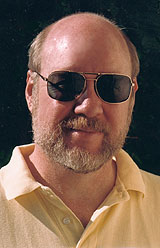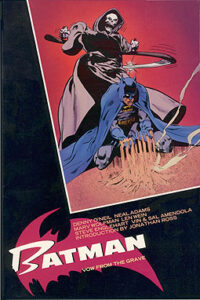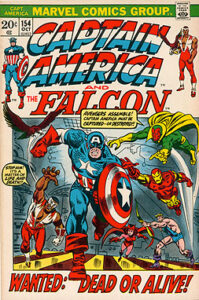Wesleyan’s Englehart ’69 Makes Life in Comics

It’s Spring 1966. Steve Englehart, a first-year Wesleyan student, is hanging around his dorm when one of his floormates thrusts a copy of Spider-Man at him saying, “You have to read this. This is great.”
Like many students his age at that time, Englehart read comic books as a child but thought that he’d grown out of them. They were considered “downmarket”—a lot of them weren’t particularly good.
Englehart read it through in one shot and sensed something very different than the wooden characters and corny storylines he encountered as a kid. Marvel had gone through a renaissance in the 1960s, embracing newfound depth and complexity in its storytelling. “I loved what (Spider-Man creator) Stan Lee was doing, the irreverence and the world-building with all of the characters interacting with each other,” he said.
The seeds for an unusual career path were being planted.
Over the next three years, trips to a newsstand on Main Street down the hill from campus to replenish his collection led to jaunts to New York City, where Englehart hung around comic book stores and haunted the offices where they were written, something just not done at the time. “They didn’t know what to do with me when I just showed up,” Englehart said.

That comic book-smitten psychology major went on to write for some of the most iconic characters in the superhero firmament: the Avengers, Dr. Strange, Batman, Spider-Man, Superman, and Wonder Woman, among many others. Chances are, if you are a comic book fan of a certain age, Steve Englehart had a hand in your childhood—and maybe your adulthood as well.
As often happens in the best superhero origin stories, it was all a matter of being at the right place at the right time and being open to something new. “If someone hadn’t shoved the Spider-Man into my hand at that point, I don’t know where I would’ve gone,” he said.
There was no way back then to anticipate the current cultural ubiquity of superhero stories, he explained. In the 1970s, a comic book might sell 750,000 to a million copies to comic book lovers. “That was the entire sum total of people who were into comics and everybody who wasn’t into comics was sure they were crap,” he said.

When Englehart entered the field, characters had not yet become multi-billion-dollar IPs. Englehart was allowed to revamp Captain America and Batman—the stories were hemorrhaging readers and he was given carte blanche to try new things. Englehart returned Batman to his noir roots and presented the Joker as a homicidal maniac, the predominant readings of the characters today. He changed Captain America’s focus from World War II heroism to championing American ideals.
“It was complete creative freedom,” he said. “It was like, ‘How far can I take any of these things?,’ which is why those books, to a great extent, stand out after all this time. They weren’t the product of a committee anywhere. They were written by somebody who really wanted to do great things with this medium. There were a lot of people alongside me who had the same viewpoint.”
The form was meant to be consumed and enjoyed in the moment, Englehart said. The idea that they would become classics was never part of the calculation when they were creating the books. “It’s still pretty amazing that characters I created or stories that I wrote could cause people to want to make movies out of them,” he said.
Every few years, Englehart takes a break from comics. He has written novels and video games. It was important for him as a writer to not become what he termed “a brain-dead hack” churning out comic book stories every month until his creativity dried up.
He’s got a few projects in the works. One story is being considered for a Netflix series. Another one is being shopped as either a comic book mini-series or a film.
Not bad for a Wesleyan kid who just wanted to make a living stringing some words together, trying to create exciting characters who had something to say about the world. “I understood fairly quickly that the reason I was interested in psych was because I wanted to know why people do what they do. By the time I got my degree I thought that psych had 30 different explanations for that and I only wanted one. I found that in writing. I could get inside all these different characters; I could be Captain America. I could be Batman and look at the world through their eyes,” he said.
Read more in this sidebar story on Englehart’s original Marvel character—Shang-Chi—making its big-screen debut this fall.

